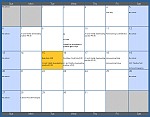Hopefully you’ve started adjusting to our new normal of
isolation. Although parts of the job market are at a standstill, there are
things you can do both for job searching and for thinking about a future career
shift or further education.
Additionally, some industries are in big hiring modes, if you are in
need of immediate cash flow; think warehouse, transportation, logistics,
healthcare, food, pharmacy, and technology. Now may be a good time to dust off or refine
your resume, reflect on what you want out of your life and career, and consider
adding to your skill set. Keep reading for my 7 career tips in uncertain
coronavirus times.
Think: Be prepared, be ready!
I first started thinking about what makes sense to do during
this time when a client emailed me even before the stay-at-home advisories
asking “should we even meet about the job search since no one will be
networking?” At some level it reminded
me of what clients say in December: “Should I even job search since no one will
be hiring during the holidays?” Even if not
much hiring is happening, it good to keep things going since an according to
the Department of Labor in 2019 an average job search took approximately five
months. More time is needed if you are considering a career change. Some people
may even have more time available for a networking conversation. In today’s new
world of social distancing, people may actually welcome a remote opportunity to
connect or may be in a more altruistic mood.
1. Reach out for relationships
and networking –Consider simply reaching out to someone you haven’t
connected with to stay in touch and ask “how are you?” Don’t forget to reply back. My clients sometimes say they don’t feel like
they can reach out to ask a networking question since they haven’t been in
touch for a quite a while. This is your
opportunity to reconnect with people from long ago, and it won’t seem odd. When
you do purposefully reach out for networking, remember that this is about
seeking information and advice, not asking about job openings (they will tell
you!). Offer support and assistance to others as well.
2. Reflect and reassess your
goals – The upheaval may cause you to think about exploring a career shift
for greater satisfaction. Alternatively,
you may have lost a job in an industry that is hard hit, and you need to
explore a shift out of necessity. Typical steps of career exploration involve
self-assessment, including interests, skills, personality traits and
values/what you want from a job. Then explore and research career and education
options, including the job market.
3. Build your skills – Through career research you may find a need to gain some skills for a career shift or to increase marketability. Now may be a good time to catch up on the professional development reading you’ve set aside. New and free webinars are being offered to develop personal and professional skills. Many free on-line education platforms exist, although some have a mix of free and fee-based offerings. Click here for a top 10 from Forbes and click here for a top 25 from LifeHack.
4. Upgrade your technology – As part of developing your skills, give
some special attention to technology since this is a necessary and marketable
skill. Learn tips on how to use and
present your best self on video platforms like Zoom. Free conference call tools
are another resource to learn about and use, even if just for family calls. This
may also include upgrading your physical technology with better audio
equipment. Employers are always looking for people comfortable with technology.
Sharing that you’ve recently learned new tech skills will be a plus for your
job search, especially if you are a mature job seeker.
5. Polish your presence –
Revise your resume, making sure it is current and targeted to your goals.
Enhance your LinkedIn profile by completing sections, inviting links with
personal messages, giving and requesting recommendations, and participating in
interest groups related to your career. If applicable, update or add to your
professional website or portfolio.
6. Take action – Keep
applying if you are in search mode even if you think people aren’t hiring or won’t
respond. Don’t just bury your head in the sand. Recognize that the hiring
process may take longer. Follow-up periodically to stay in the game and show
interest. Get creative. I recently advised
a client applying for English instructor positions to send the department heads
a few relevant, inspirational passages from literature as a follow-up.
7. Take care of yourself and
others – Stay connected with people, get adequate rest, eat healthily,
exercise, get out in nature, enjoy a favorite hobby, read inspirational
material, meditate or pray. Take care of others too, such as calling relative,
friend, or neighbor, sending someone an uplifting message, or volunteering
safely if you can.
We’re all in this together and hopefully we will come out
stronger, wiser, and more compassionate.
I am happy to help you whether for career and education
goals or the job search, whether an immediate need or planning for the future.
To keep us all safe, I am working remotely via video or phone. Call me at
412-977-4029 to explore or schedule. Gift certificates are available.
Don’t quarantine your career!
Think: Be prepared, be ready!



 Each day look for things that are positive. It could be something small like a beautiful sunset, a favorite food, an email from a friend, or a special moment with your child or pet. Maybe there could be things about your search process you can be grateful for, such as an email reply, a job prospect, or a networking meeting even if only 5 minutes of it was helpful. Perhaps there is even something to be grateful for about being in the midst of the search itself, whether getting to spend more time with family due to a job loss or recognizing your courage to explore a new direction.
Each day look for things that are positive. It could be something small like a beautiful sunset, a favorite food, an email from a friend, or a special moment with your child or pet. Maybe there could be things about your search process you can be grateful for, such as an email reply, a job prospect, or a networking meeting even if only 5 minutes of it was helpful. Perhaps there is even something to be grateful for about being in the midst of the search itself, whether getting to spend more time with family due to a job loss or recognizing your courage to explore a new direction.